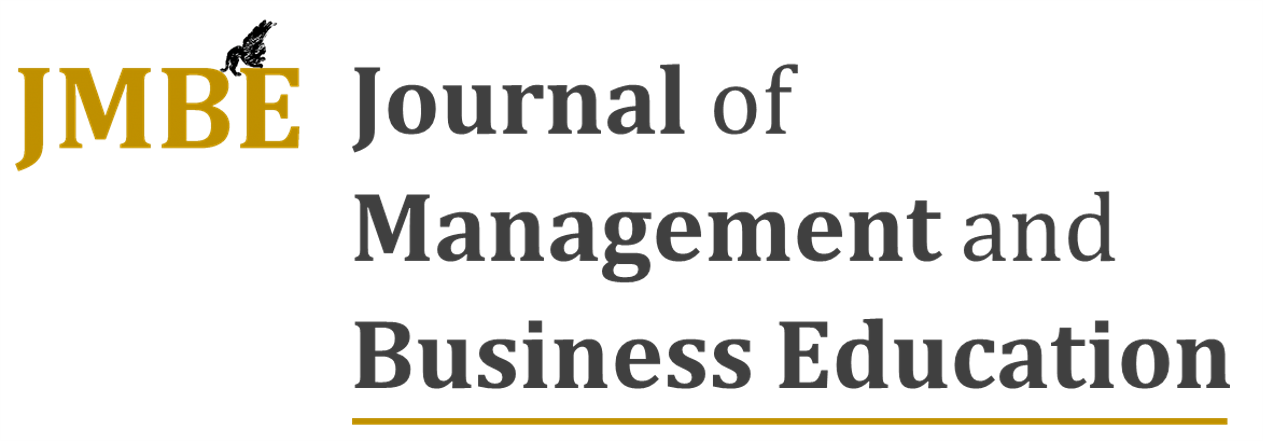Effects of self-assessment and 360 degree feedback on teaching-learning process
DOI:
https://doi.org/10.35564/jmbe.2018.0016Keywords:
Teaching innovation, self-assessment, 360 degree feedback, learning process, university educationAbstract
This paper highlights the importance of evaluation as part of the teaching-learning process and aims to show its usefulness for both the teacher and the student. To this end, two teaching innovation projects have been designed. The first focuses on self-assessment and the second on the 360 degree feedback. The results of the first project show that self-assessment contributes to the improvement of the student's final grade. In the second project, it is verified that the students are satisfied with the 360 degree feedback and, in addition, they show greater satisfaction with this form of assessment than with the traditional assessment carried out only by the teacher. With respect to the deviations in the scores given by the different evaluators, they move between 0% and 41%. From these projects it can be deduced that the use of new ways of evaluating the work of university students has a positive effect on their learning and on their satisfaction.
Downloads
References
Alfalla-Luque, R.; Medina-López, C. & Arenas-Márquez, F. (2011). Mejorando la formación en Dirección de Operaciones: la visión del estudiante y su respuesta a diferentes metodologías docentes. Cuadernos de Economía y Dirección de la Empresa. 14. 40-52.
https://doi.org/10.1016/j.cede.2011.01.002
Bourke, R. & Mentis, M. (2011). Self-assessment as a process for inclusion. International Journal of Inclusive Education. 17(8). 854-867.
https://doi.org/10.1080/13603116.2011.602288
Calatayud, A. (2002). La cultura autoevaluativa, piedra filosofal de la calidad en educación. Educadores. 204. 357-375.
Camacho Gironda, C.A. (2014). La autoevaluación en el aula Un método innovador para mejorar la calidad del proceso enseñanza-aprendizaje en la formación de maestras y maestros. Integra Educativa. VII(2). 159-172.
Castilla-Pozo, F. (2011). Calidad docente en el ámbito universitario: un estudio comparativo de las universidades andaluzas. Revista de Educación en Contabilidad, Finanzas y Administración de Empresas. 2. 157-172.
https://doi.org/10.12795/EDUCADE.2011.i02.09
Contreras, E. (2004). Evaluación de los aprendizajes universitarios. En Docencia universitaria. Orientaciones para la formación del profesorado. Documentos ICE (pp.129-152). Oviedo: Universidad de Oviedo.
De Grez, L., Valcke, M. & Roozen, I. (2012). How effective are self- and peer assessment of oral presentation skills compared with teachers' assessments?. Active Learning in Higher Education. 13(2). 129-142.
https://doi.org/10.1177/1469787412441284
Dochy, F., Segers, M. & Sluijsmans, D. (1999). The use of self-, peer and co-assessment in higher education: A review. Studies in Higher Education. 24(3). 331-350.
https://doi.org/10.1080/03075079912331379935
Dolan, S.L., Valle Cabrera, R., Jackson, S.E. & Schuler, R.S. (2007). La gestión de los recursos humanos. Madrid: McGraw Hill.
Estelles-Miguel, S.; Peris-Ortiz, M.; Albarracín Guillem, JM.; & Palmer Gato, ME. (2018). Nuevas formas de enseñanza y aprendizaje en dirección de producción y operaciones. Journal of Management and Business Education, 1(1). 69-79.
https://doi.org/10.35564/jmbe.2018.0006
García-Beltrán, A.; Martínez, R.; Jaén, J.A. & Tapia, S. (2016). La autoevaluación como actividad docente en entornos virtuales de aprendizaje/enseñanza. Revista de Educación a Distancia. 50(14)-.1-11.
https://doi.org/10.6018/red/50/14
Gómez-Mejía, L.R., Balkin, D.B. & Cardy, R.L. (2016). Gestión de recursos humanos. Madrid: Pearson Educación.
Inda Caro, M., Álvarez González, S. & Álvarez Rubio, R. (2008). Métodos de evaluación en la enseñanza superior. Revista de Investigación Educativa. 26(2). 539-552.
Logan, E. (2009). Self and peer assessment in action. Practioner Research in Higher Education. 3(1). 29-35.
Martín, A., León, C. & García, A. (2014). Innovación docente para la integración de autoformación y autoevaluación en la plataforma webct. Revista de Medios y Educación. 44. 201-214.
https://doi.org/10.12795/pixelbit.2014.i44.14
Mauri, T., Coll, C. & Onrubia, J. (2007). La evaluación de la calidad de los procesos de innovación docente universitaria. Una perspectiva constructivista. Red U. Revista de Docencia Universitaria, 1. Obtenido de http://www.redu.um.es/Red_U/1/
https://doi.org/10.4995/redu.2007.6290
Ndoye, A. (2017). Peer / Self Assessment and Student Learning, International Journal of Teaching and Learning in Higher Education. 29(2). 255-269.
Pérez, O. (2015). ¿Qué es la evaluación de 360 grados y qué beneficios aporta a tu empresa?. Obtenido de http://blog.peoplenext.com.mx/que-es-la-evaluacion-de-360-grados-y-que-beneficios-aporta-a-tu-empresa
Planas Lladó, A., Soley, L.F., Fraguell Sansbelló, R.M., Pujolras, G.A., Planella, J.P., Roura-Pascual, N. & Moreno, L.M. (2013). Student perceptions of peer assessment: An interdisciplinary study. Assessment & Evaluation in Higher Education. 39(5). 592-610.
https://doi.org/10.1080/02602938.2013.860077
Reinholz, D. (2016). The assessment cycle: A model for learning through peer assessment. Assessment & Evaluation in Higher Education. 41(2). 301-315.
https://doi.org/10.1080/02602938.2015.1008982
Sánchez-Marín, G.; Lucas-Pérez, M.E.; Carrasco-Hernández, A.J.; Lozano-Reina, G.; & NicolásMartínez, C. (2018). The influence of self-assessment activities on student learning outcomes. Journal of Management and Business Education, 1(1). 28-38.
https://doi.org/10.35564/jmbe.2018.0003
Sánchez-Vidal, M.E., Cegarra-Leiva, D. & Rodríguez Arnaldo, O. (2017). Una experiencia de innovación pedagógica basada en la clase inversa y las nuevas tecnologías. Análisis de resultados de aprendizaje y satisfacción en un curso de la universidad. CEF. 8. 11-38.
https://doi.org/10.51302/tce.2017.152
Sharma, R.; Jain, A.; Gupta, N.; Garg, S.; Batta, M. & Dhir, S.K. (2016). Impact of self-assessment by students on their learning. International Journal of Applied Basic Medical Research. 6(3). 226-229.
Downloads
Published
How to Cite
Issue
Section
License
Copyright (c) 2023 Journal of Management and Business Education

This work is licensed under a Creative Commons Attribution-NonCommercial-ShareAlike 4.0 International License.
License terms at: https://creativecommons.org/licenses/by-nc/4.0/legalcode




